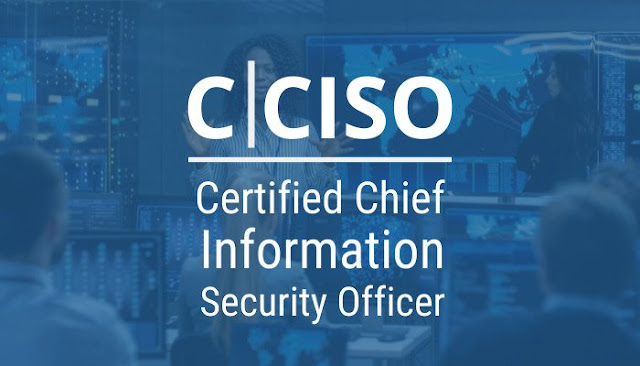EC-Council’s CCISO Program has certified leading information security professionals around the world. A core group of high-level information security executives, the CCISO Advisory Board, contributed by forming the foundation of the program and outlining the content that would be covered by the exam, body of knowledge, and training. Some members of the Board contributed as authors, others as exam writers, others as quality assurance checks, and still others as trainers. Each segment of the program was developed with the aspiring CISO in mind and looks to transfer the knowledge of seasoned professionals to the next generation in the areas that are most critical in the development and maintenance of a successful information security program.
The Certified CISO (CCISO) program is the first of its kind training and certification program aimed at producing top-level information security executives. The CCISO does not focus solely on technical knowledge but on the application of information security management principles from an executive management point of view. The program was developed by sitting CISOs for current and aspiring CISOs.
In order to sit for the CCISO exam and earn the certification, candidates must meet the basic CCISO requirements. Candidates who do not yet meet the CCISO requirements but are interested in information security management can pursue the EC-Council Information Security Management (EISM) certification.
What is the role of a certified Chief Information Security Officer(CISO)?
The CISO position emerged worldwide as a designation of executive leaders who can address the emerging threats to information security by developing and maintaining a tough information security strategy. CISOs – with the experience, leadership, communication skills and innovative strengths are born to resolve the ever-growing information security threats. The CISO of tomorrow will play a vital role in creating effective and efficient processes and will lead a team of technically skilled professionals to defend the core interests of their organization.
Become a Chief Information Security Officer
Today’s world is one of constant and instant information exchange. Organizations, be it private businesses or government bodies, rely on sophisticated computer databases and networks to share digital information on a daily basis with their subsidiaries, branches, partners, clients, employees, and other stakeholders. However, years of information security incidences and the onslaught of the recent cyber-attacks prove that digital data can be easily compromised. Organizations therefore, are increasingly in need of a new set of skills and processes to ensure the security of information at a scale that will be required tomorrow.
If your aspiration is to have the highest regarded title within the information security profession – CISO, if you already have earned the role of a CISO, or if you are currently playing the role of a CISO in your organization without the official title, the CISO designation is the recognition of your knowledge and achievements that will award you with professional acknowledgement and propel your career.
Achieving the CCISO Certification will differentiate you from others in the competitive ranks of senior Information Security Professionals. CCISO will provide your employers with the assurance that as a CCISO executive leader, you possess the proven knowledge and experience to plan and oversee Information Security for the entire corporation.
Certification Target Audience
CCISOs are certified in the knowledge of and experience in the following CISO Domains:◉ Governance (Policy, Legal & Compliance)
◉ IS Management Controls and Auditing Management (Projects, Technology & Operations).
◉ Management – Projects and Operations
◉ Information Security Core Competencies.
◉ Strategic Planning & Finance
Clause: Age Requirements and Policies Concerning Minors
The age requirement for attending the training or attempting the exam is restricted to any candidate that is at least 18 years old.
If the candidate is under the age of 18, they are not eligible to attend the official training or eligible to attempt the certification exam unless they provide the accredited training center/EC-Council a written consent of their parent/legal guardian and a supporting letter from their institution of higher learning. Only applicants from nationally accredited institution of higher learning shall be considered.
Passing Criteria:
In order to maintain the high integrity of our certifications exams, EC-Council Exams are provided in multiple forms (I.e. different question banks). Each form is carefully analyzed through beta testing with an appropriate sample group under the purview of a committee of subject matter experts that ensure that each of our exams not only have academic rigor but also have "real world" applicability. We also have a process to determine the difficulty rating of each question . The individual rating then contributes to an overall "Cut Score" for each exam form. To ensure each form has equal assessment standards, cut scores are set on a "per exam form" basis. Depending on which exam form is challenged, cut scores can range from 60% to 85%.
Source: cert.eccouncil.org






0 comments:
Post a Comment